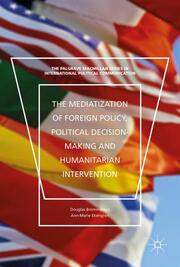Detailansicht
The Mediatization of Foreign Policy, Political Decision-Making and Humanitarian Intervention
The Palgrave Macmillan Series in International Political Communication
ISBN/EAN: 9781137544605
Umbreit-Nr.: 9962384
Sprache:
Englisch
Umfang: xiii, 206 S., 13 s/w Illustr., 206 p. 13 illus.
Format in cm:
Einband:
gebundenes Buch
Erschienen am 16.01.2017
Auflage: 1/2017
- Zusatztext
- This book examines under what scope conditions foreign policy actors are more or less likely to adopt, or at least act according to, media logic. The authors analyze this media logic under three specific scope conditions: uncertainty, identity, resonance. First, they lay out the general adaptation of media logic in the general debate of the UN General Assembly 1992-2010. They then explore the adaptation of media logic under six different foreign policy decision-making processes, as expressed through the self-perceived foreign policy roles of Finland, Sweden and the United Kingdom in the cases of humanitarian intervention in Côte d'Ivoire and Libya, both in 2011. The results of this study indicate the need to move beyond the assumption of a general process of mediatization affecting politics in total, across contextual factors. Instead, they point in the direction of a nuanced process of mediatization more likely under certain scope conditions and in certain political contexts.
- Kurztext
- This book examines under what scope conditions foreign policy actors are more or less likely to adopt media logic. The authors analyze this media logic under three specific scope conditions: uncertainty, identity, resonance. First, they lay out the general adaptation of media logic in the general debate of the UN General Assembly 1992-2010. They then explore the adaptation of media logic under six different foreign policy decision-making processes in Finland, Sweden and the United Kingdom concerning the cases of humanitarian intervention in Côte d'Ivoire and Libya, both in 2011. The results of this study indicate the need to move beyond the assumption of a general process of mediatization affecting politics in total, across contextual factors. Instead, they point in the direction of a nuanced process of mediatization more likely under certain scope conditions and in certain political contexts.
- Autorenportrait
- Douglas Brommesson is Associate Professor in Political Science at Lund University, Sweden. His main research interests include foreign policy analysis, international relations and religion and politics. Most recently, he co-edited the volume Global Community? Transnational and Transdisciplinary Exchanges (2015). His articles have appeared in journals such as Cooperation and Conflict, International Politics, the Journal of International Relations and Development, and the International Review of Sociology. AnnMarie Ekengren is Professor in Political Science at the University of Gothenburg, Sweden. Her research areas are foreign policy decisionmaking, international relations and party politics. Ekengren is the author of seven books and has published articles in the International Review of Sociology, International Studies Quarterly and Party Politics among others.
